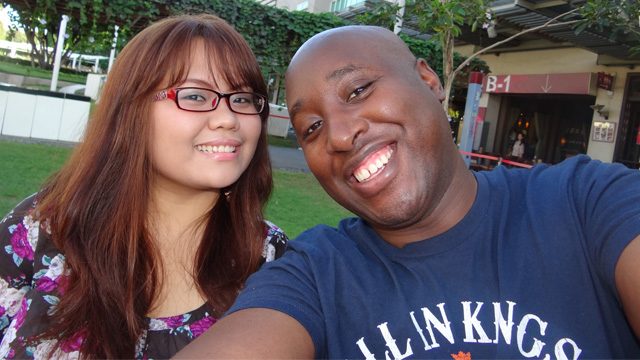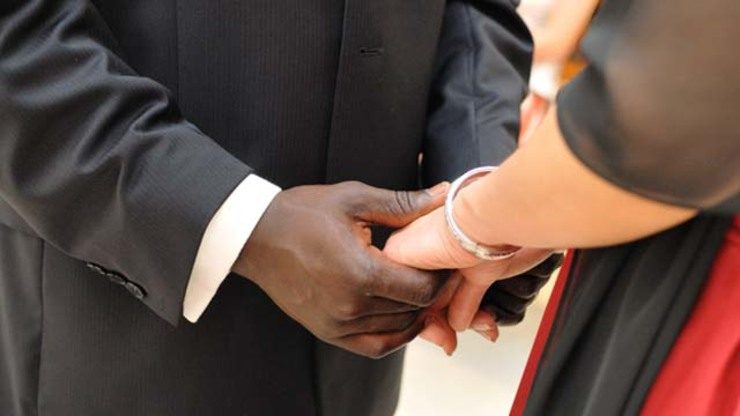SUMMARY
This is AI generated summarization, which may have errors. For context, always refer to the full article.

I am a proud black man with mahogany brown skin, born in the United States of America. My wife is a proud Filipina, a morena, born in The Philippines. Why did we choose one another and what motivated us to enter into an interracial marriage?
I myself am the product of a multicultural marriage. My father is of Jamaican descent and my mother is of Cuban descent. Although I was born an American, my existence is owed to the chance meeting between a poor Cuban nurse working in a Jamaican/Cuban medical exchange program and a male culinary student who happened to get himself hurt and medically treated at that same hospital.
After days of flirting with my mom, my dad finally convinced her to go on a date with him. And so the courtship began. In between a little bit of Jamaican rum and a midnight skinny dip in Ocho Rios, I was conceived. After discovering her pregnancy my mother and father married immediately and moved to The United States of America.
Growing up
As a black child living in 1970s America, race relations were really bad. In my city alone there were numerous stories of police brutality, and lynching. My sister and I had been chased several times by truckloads of drunken men simply because of the color of our skin. It was a scary time to be a child. It was within this environment that my beliefs on race were molded.
If living in a racially volatile environment molded my beliefs, my grandmother was there to make sure those beliefs were solid. She was a strong woman who refused to allow us to make generalizing statements against any ethnicity. If we were chased by drunken white men, she only allowed us to speak of those particular white men. If there were stories on television about racial intolerance, she explained both sides of the argument and did her best to make sure we empathized with both perspectives. There is not a single woman on earth that had more influence on my way of thinking about race than my grandmother.
But that’s enough of my backstory. Let’s get to the present day and the focal point of this discussion. What motivates someone to move beyond the comfort of his people into the turbulent realm of interracial relationships?
Dating within and outside my race

I never made a conscious effort to move beyond my race. My skin color is beautiful to me. I am immensely proud of my heritage and the struggles that my people have made. I’ve dated within my race for many years. There are many beautiful things about black women and prior to my marriage, I could never completely rule them out of my dating pool. They are sexy, intelligent, family-oriented and loving.
But if I’m being completely honest about my history with women of all races, I have to admit that I’ve never really seen myself as “black” when I’ve approached a woman. I’ve only considered myself a man. It has always been about attraction with me. The color of a woman never really moved me towards sexual interaction. I’ve been more attracted by their physical and emotional attributes than which part of the world they came from.
And to be even more transparent, most women that I’ve approached were simply waiting for an invitation. In my opinion, when you meet a woman that holds very racist views she has been programmed by a society that gives very few equal rights to women as a whole. Sometimes, people have to adapt to narrow-minded beliefs from others present around them in order to survive.
I’ve dated African American, Caucasian, Japanese, Chinese, Filipino, Brazilian and African women. Among the cultures listed, I’ve never encountered a woman that refused to date me based on the color of my skin. Never. They were simply waiting for an invitation. Not because they didn’t like my color, but because they were more concerned with what their societies or families would think.
But just because those individuals were willing to take the interracial plunge with me doesn’t mean that they didn’t have a lot of stereotypical stuff for me to overcome. For example, one of the beautiful women I dated believed that African American men had gigantic sexual appetites and gigantic equipment to go along with it. She had never dated an African American man and only had her gossiping friends to get her information from. Now it was absolutely shocking for me to hear her present that question to me.
That particular situation seems like it would be a one-off incident, right? We live in the age of technology. People can research anything with the touch of a button. Surely this type of thinking is not something that is prevalent in a lot of countries. Well I encountered some of that same thinking in the Philippines. And I got most of it from my wife, her family, and her friends.
Grateful for my wife’s presence
Sometimes my wife and I lie in bed and laugh about many of those things. A lot of it was hilarious but some of it was painful. But I tried not to directly blame the individuals for being narrow-minded. I took the opportunity to learn from them and to educate them (and be educated).
For example, my wife and I met while I was on a business trip in Manila. She worked for a local utility company and I worked for the largest bank in North America. I flirted and she flirted. Soon we were communicating continuously via telephone and email. Through numerous trips to Manila we decided to make things official and get married.
When we walked in public I noticed the stares we would get. When we were in malls people would actually point to us and whisper. I always assumed that it was because I was a foreigner. But it happened everywhere we went. Soon my wife noticed my discomfort and educated me. She explained that although her country attracts a large portion of foreigners, there aren’t as many black men.
That made sense to me because I didn’t see many black men anywhere we traveled. But it got deeper. She explained the reason there are few people of color on television, she talked about the colonization of the Philippines by several cultures, and the impact that event had on the Filipino culture as a whole. It was definitely an eye-opener. I was grateful for my wife’s presence and I appreciated her history more.
The positive parallels between the Filipino and the African-American cultures are astonishing. Our histories are very similar. Both of our cultures had to overcome the influence of outside invaders. We both were made stronger from those events. From the Filipinos I’ve met, there is a strong work ethic. That trait is a definite parallel to African Americans. We want the most for our families and will often go above and beyond to get those things.
Filipinos have a wonderful ability to let loose and have fun. So does the African American. There is nothing we love more than music. The Filipino and the African American have similar musical tastes. We are both happy cultures, many of us with a love for God, food, and making the best out of any situation.
As it pertains to racial tolerance, America still has a long way to go to fix that problem. There are still lots of murders attributed to racism every year. And as much as I want to complain about the skin dyeing phenomenon within the Filipino culture, some African Americans also belong to that fraternity of being influenced and thinking that white is beautiful and black is not. Beyonce’s hair is basically a weave. Her hair isn’t that straight. She uses relaxers and chemicals to maintain that beauty. So I can’t judge the Filipino too harshly in that category.
But at the end of the day, my wife and I entered an interracial marriage, not because of skin color or my sexual prowess. We entered because we are vulnerable PEOPLE. Realizing that life’s challenges far outweigh the color of a person’s skin is an intellectual move that shows respect for God and maturity.
My daughter isn’t Filipina or black. She’s my daughter. And just as my grandmother taught us to love all people without seeing color, my wife and I will do the same. The world is getting smaller. The world is changing. Like it or not, interracial relationships are increasing, not diminishing. If a person wants happiness, love has to be the primary objective. And so it was for us. – Rappler.com
Photo of wedding via Shutterstock

Joe Jones is an American freelance writer who originates from Washington DC. He has worked as an executive in the banking industry for 15 years but left to start his own company. He recently decided to relocate to the Philippines to be with his Filipina wife and daughter. Visit his blog and read more of his work here.
Add a comment
How does this make you feel?
There are no comments yet. Add your comment to start the conversation.